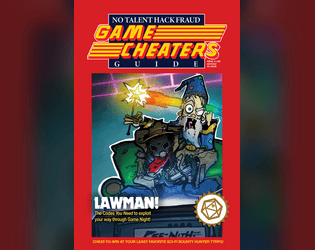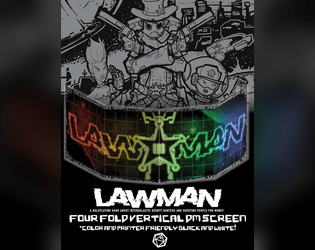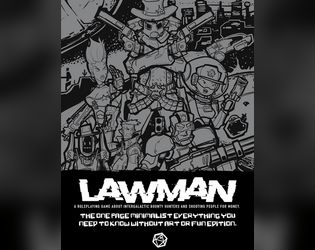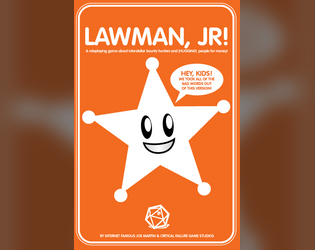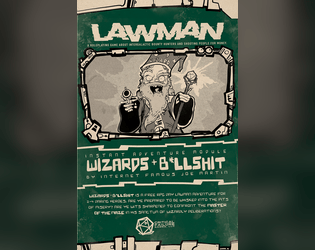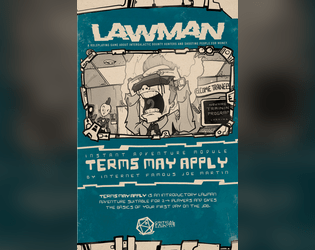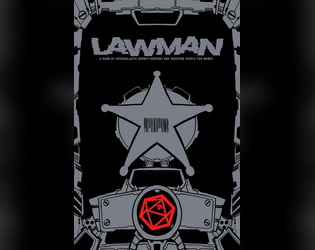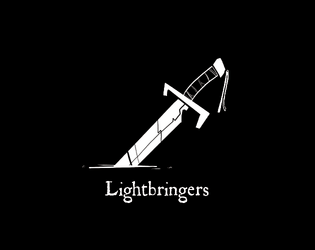Thank you so much for replying. I'm having a blast trying to think of this and am still super sorry it's not in the main book.
Internet Famous Joe Martin
Creator of
Recent community posts
After reading your reply, I really like the idea of revising this already, with a "leads are cashed in, and it the target number is close but not quite there - there's a complication, that will still lead to them tracking the guy down, but not without a shakedown, an encounter, or something else that gets in the way BEFORE the event factor."
And if they're way off (DM discretion), it just winds up being a dead end.
I guess it's just establishing those acceptable thresholds.
I wrote this as sort of an assembly cut to this idea (before i saw you responded with the Avatar clock, a system that i actually JUST picked up, actually), and wanted to know what you thought of it in concept. I'd like to fine tune it with something you want, and when i get around to doing a 2nd edition, would love to pen you as an inspiration for making this addition happen.
Let me know what you think. Like i said. This was sort of a tangental approach, but i was sort of thinking about, well, the board game Android as a source for it, since i sort of enjoyed it's abstract approach for it, as well as bits of, well, honestly some Shadowrun 3rd. (gulp.)
---
Investigation Mechanic: (an idea at this point.)
A series of extended tests simulating active searching to find information about your suspect.
You can do a test of uninterrupted, undistracted activity (handled as three hours of in-game time activity). If something else happens, the test is interrupted, and the players will have to start over, meaning the test is a failure and no leads are generated.
Tests start at a base difficulty of tough (5 or under), and can be improved by DM approved tags to make it an easier roll.
Roll a d20, beat the check, and see the results.
Successful tests earn one lead.
Critical successes earn five leads.
(Adjective) points can be spent on a success to increase the number of leads by +2 per point. If no success is rolled, you can spend one (Adjective) point to get at least one lead, anyway. However, A DM can expend a Fuck You point to negate (Adjective) points spent for this check.
Critical failures will remove all earned leads and the players will have to start over from scratch, with the DM telling some kind of story about this information being a dead end or a red herring or the Lawman needing to get it together because this is going nowhere.
Leads are typically rolled by one player amongst the group to simulate the active group, but if the group insists on pooling it’s resources, consider their shared efforts to generate three leads for a success and ten for a critical success.
Leads are basically defined as digital fingerprints, known hangouts, associates, and information that can generally be pooled by database to assess where this individual is.
The DM (secretly) determines the number of leads that are required to unveil some key point of information relevant to tracking down their suspect. The information can be as direct as their exact whereabouts, or a good idea to their regular hangouts or activities.
Example difficulties based on your scumbag perp:
Idiot Criminal Dum-Dums, (if not out in the open as it is, which means that they’re one lead away from being caught) might be 3 to 7 leads to locate.
Actual Criminal Professionals may require 8-12.
And people that KNOW how not to get caught might be a minimum of ten, with no maximum capacity. It’s the DM’s determination.
Once the information has been gathered, the players may choose as an action to explore their gathered leads, which is the activity of pooling it all together to create an active storytelling path to hunt the criminal down. If they have enough leads to meet or exceed the DM’s target number, they will unlock some crucial and critical piece of information that might lead them towards their target.
If they do choose to explore their leads and they don’t have enough to meet or exceed the DM’s target, storytell a situation here they go out, hit the streets and spaceways, ask around, and come up with nothing. (The DM can also introduce something else story wise to interrupt their search, say, an unforeseen shakedown by allies of the suspect, or some situation that needs to be addressed.) Unless something drastically affecting the storytelling occurs - they don’t lose the leads for trying - They just come up empty for the moment, and more work will need to be done or something will come up to address the shortfall.
Leads generated only apply to the individual they are searching for, and once they encounter them and capture them (or not), they are considered spent. If the suspect gets away, you will have to begin the search again. (at a much higher DM determined difficulty rating.)
Leads for a suspect are for that suspect only and will not carry to hunting down another suspect. Those leads stay with the target.
---
Let me know what you think! The numbers might be fudged. I haven't playtested it yet, but it's pretty much just an abstract information commodity versus target system. I'm trying to think of ways to make it a little more spicier.
I've been thinking about this a lot since your initial comment and am trying to think of a system for it and attaching it to the bundle as extended information.
I don't know if this is a situation that requires some extended skill challenges to do that setup, or something, but you're presenting a lot of interesting information that i'd like to try out and write a proper system for, for anything else to give you a concrete system of doing it.
I picked up the Blade Runner TTRPG, and while i haven't gotten it to the table, i know one of it's negative remarks is that the investigation system isn't as robust or functional as expected. While i can't verify that (yet) i find it interesting that something that seemingly should have been a slam dunk, well, wasn't. And this puts me in an interesting school of thought to explore this and make something.
Will love to make something that i hope will work well with what you want or hope to get from it. :)
You know. Great advice. I think part of me wrote this while assuming that this would be part of the standard storytelling standard that is akin with TTRPG and maybe i didn't think to explain it very well.
I'm thinking of a way to write some addendum pages and include it with this for somebody who might be looking for this experience.
A lot of this assumed it would be done with generating tasks that the DM would give a difficulty rating based on complexity through storytelling,
ex. "Hansen arrived on Spacedock 447-b and started asking around for the whereabouts of Muldoon. Since he's not sure where to start, it would be a tough check, unless Hansen could tell me a reason why he might actually have some clues or leads to change this difficulty to a normal, possibly easy check."
But i can see about clarifying it with further detail. I've been looking at writing additional mechanics, and maybe it wouldn't be bad to further flesh that out.
I'm sorry for the lack of clarity on this in the book. And thanks for the advice and insight. It's appreciated. :)




